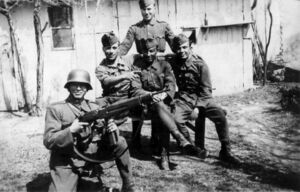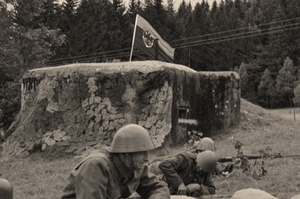Stedorian-Walnerian War
This article is incomplete because it is pending further input from participants, or it is a work-in-progress by one author. Please comment on this article's talk page to share your input, comments and questions. Note: To contribute to this article, you may need to seek help from the author(s) of this page. |
| Stedorian-Walnerian War | |||||||
|---|---|---|---|---|---|---|---|
 Walnerian soldiers in Starbov | |||||||
| |||||||
| Belligerents | |||||||
|
Political support: |
Political support: | ||||||
| Commanders and leaders | |||||||
|
|
| ||||||
| Strength | |||||||
| 1.5 million troops | 1.9 million troops | ||||||
| Casualties and losses | |||||||
| ~250,000 killed | ~300,000 killed | ||||||
The Stedorian-Walnerian War (Stedorian: Krig Stedoriäna⸗Roberiänik; Walnerian: Stedorínsse-Rósberisse Kríg) was a war fought between Stedoria and Walneria in 1939 and early 1940 over the independence of Walneria. The war eventually ended with Walnerian victory and withdrawal of Stedorian forces and Walnerian victory. Dazhdin forces joined the invasion force, attacking multiple border settlements in the west of Walneria, although the attack was quickly repelled and peace was quickly established on that front.
Background
Stedoria and Walneria have historically close cultural ties. After the revolution in Walneria in 1899 and more wide-spread implementation of the Pan-Dolchic ideology in Stedoria, relations begin to cool down, as both sides had worries, that the actions done by the other are threatening.
Stedoria was concerned about the fall of Walnerian royalty and nobility and establishment of a full democracy with president as a head of state and prime minister as a head of government, as Stedoria itself was still a monarchy and an authoritarian country to some extent.
Walneria was concerned about their independence, as historically, Stedorians claimed some sort of sovereignity over Walneria and their Pan-Dolchic stance may serve only as a prelude to Stedorian imperialism trying to take over Walneria and annex it inot Stedoria.
Escalation
Diplomatic prelude
In mid 1936, Stedorian government stated a claim over multiple border towns in Walneria, as well as starting a "We are all Dolchics" campaign, based on the Pan-Dolchic ideology which was implied by the governmental practicalities. In reality tho, the government was mostly pro-imperial with expansionist tendencies. Modern historians agree, that the nationalist basis of the international politics was rather used as a political tool in their way towards imperialism and expansionism rather as a genuine idology. Walneria, in response, refused to negotiate giving up land and put up multiple sanctions, such as ban on arms or heavy industry export.
In December 1936, a bill passed in the Walnerian Parliament and Walnerian Senate, presenting and approving a project, which aimed to create three layers of fortifications on the border with Stedoria, which was to be followed by a fortification project on every other boundary. The first constructions began in February 1937. Stedoria in return announced buildup of its motorized forces and raised a protest against the Walnerian government. In summer and autumn 1937, first few bunkers were finished.
In March 1938, a bill was presented in Stedoria to lay claim on all of Walneria based on the national principle (Imperialist parties denied difference between Stedorian and Walnerian populations). As a response, Walneria announced partial mobilisation of their armed forces and deported Stedorian ambassador.
The Vlarm incident
The most notable incident that lead to the war was a incident that happened in the border town of Vlarm-Wermen on April 3rd, 1939. A train passing through customs at the border from Stedoria to Walneria started speeding up even through the check was not yet concluded. Distressed Walnerian border patrol opened fire into the train, killing two Stedorians, one of which was found to be a secret service agent carrying multiple different one-time pads into Walneria.
This incident was quickly turned into a propaganda piece by both sides. Stedoria quickly seized the opportunity to show, that Walnerians are warmongering psychopaths, which just killed two innocent Stedorians. Walneria reacted by relasing the information about the presence of one-time pads and turned the incident into a proof, that the Stedorians are planning an attack.
Present day historians agree, that the incident was most likely genuine and that the one-time pads were real, but also point out, that Walnerian border patrol that day reacted excessively and broke multiple rules, such as the Rules of engagement at the time enforced by the border guard.
Mobilisation
After multiple other incidents, Stedoria announced an ultimatum to Walneria on April 24th, which demanded immediate demobilization of all Walnerian soldiers, surrender of political prisoners, disbandment of the current government and formation of a new one compliant to Stedoria (At the time, there was a party named "Party of Dolchic Unity", which was Pro-Pan-Dolchic). As a result, on April 25th, Walneria declared a full-scale mobilisation of its armed forces.
On April 26th, martial law was declared in Walneria, establishing curfew, blackouts and food rationing. On April 27th, Party of Dolchic Unity was disbanded and twelve of the most prominent leaders arrested. The mobilisation was finished in three days and soldiers were stationed in positions.
At 23:00 hours, on April 30th, first reports of border crossings were announced and the military went from emergency readiness to combat alert. At midnight, president of Walneria was notified of the attack and at 2:30, first radio broadcast announced, that the war has started.
The war
Early battles
TBA
Bunker fights
TBA
Resistance
TBA
Break in the front
TBA
Conclusion of the conflict
TBA
Aftermath
Collaboration trials
TBA
Political impact
TBA
Settlement laws
TBA



